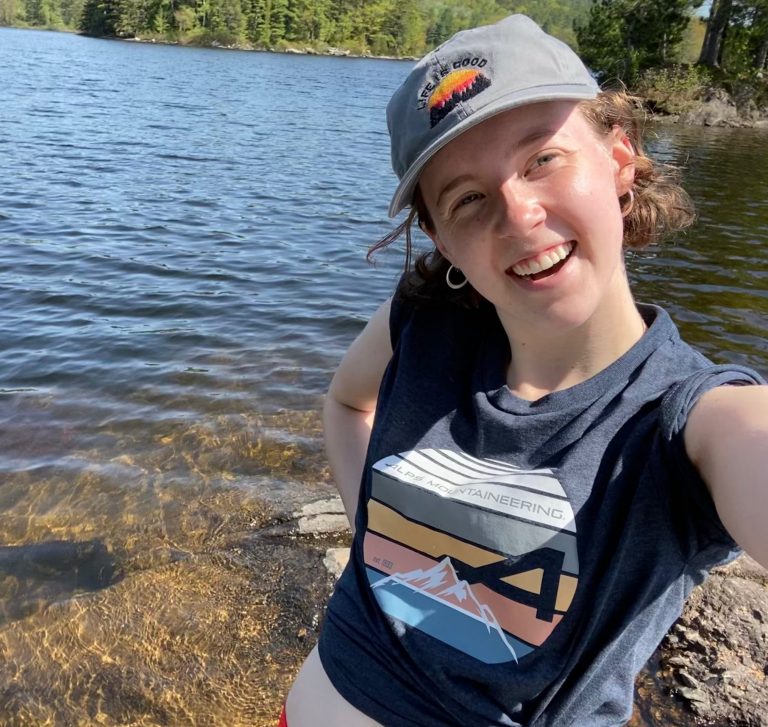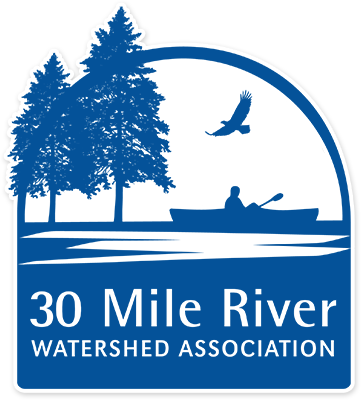Voices from the Watershed
Maggie Stokes, 30 Mile Courtesy Boat Inspector
My name is Maggie Stokes. I am a Mount Vernon resident and recent graduate of Maranacook Community High School, and I’ve been a boat inspector with 30 Mile River Watershed Association for two summers now. When I began inspecting boats, I only saw my work as an inspector being like any other summer job I’d had, but I quickly learned its importance on scales much larger than just lake health. My family moved to Mount Vernon in Summer 2017, and I quickly became enthralled by Flying Pond. Having grown up in Maine and being surrounded by water and gorgeous nature my entire life, I was so excited to have a piece of shorefront to call my own. Learning about lake health, I told myself, was one thing I could do to give back to the lake and its ecosystems.
The simple act of inspecting your boat before and after launching is a form of environmental activism. The phrase “environmental activism” is large and can seem overwhelming, but unpacked, it’s a series of simple concepts and acts one takes to speak for their environment. The simple definition is “a person who advocates for, or works towards, protecting the natural environment from destruction or pollution” (The Free Dictionary).
Taking simple initiative to inspect your boat for any plant or critter is one way that you’re advocating for the environment. That action is saying, “I care about the lake and the different ecosystems that operate in it.” Other forms of environmental activism that boaters can take include donating time to be a volunteer inspector on our lakes, giving money to (or taking a larger role in) your lake association, and practicing proper Leave No Trace protocols, and cleaning up trash wherever you see it. Being an environmental activist must include the understanding that not all folks will see the fragility of the environment from your eyes, and with that, one must hold the maturity to educate others.
Environmental activism has strong ties to social justice, stemming from the unfortunate reality that impoverished communities suffer from the effects of a poor environment at a greater rate than wealthy ones do. In the last few weeks, we’ve seen an increase in the prominence of social activists and more regular displays of social activism. These acts look like attending a protest, sharing anti-racism resources on social media, reading literature with the goal to learn about racist tendencies, as well as unlearn the racist systems in which so many of us were raised.
We can’t stop at only taking care of the environment and the outdoor spaces we love. These spaces were stolen from, and still belong to, Native Americans. The outdoors is theirs, and isn’t ours to ruin. For example, the 30 Mile River Watershed covers land that belongs to Arosaguntacook, Abenaki, Nanrantsouak, and Wabanaki Confederacy Native tribes. Because it’s not our land to destroy, it’s not our land from which to exclude others. Racial inequality has been seen too much in the outdoors. When Amy Cooper called the police on Christian Cooper, a black birdwatcher, her actions told him and Black people everywhere that they were unsafe and unwelcome in the outdoors.
The benefits from the outdoors apply to all, sometimes subconsciously. For me, the outdoors is a mental health outlet. I feel most myself when I’m sleeping outside, waking up to birds and breathing fresh air for hours on end. Environmental mindfulness focuses on the connection between our mind and the nature around us. It’s healing as well as life-saving, so why would we exclude anyone from that?
You don’t need to be an activist to care about the land. Environmental and social activism are deeply intersectional; the ways in which you care about other people can easily be translated to the natural world. It goes beyond cleaning up litter, though that is a valuable step. Do research before you go on your next adventure, and ask yourself, “Who does this land belong to? What systems are in place to protect it? Can I donate to an association that maintains this space for everyone to use?”
Learning is about asking questions. You will get it wrong, you might even be corrected, which isn’t fun at first. We humans must risk our egos and think outside of ourselves. Our planet needs all of us.

